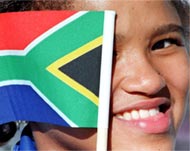Mandela retires from public life
South Africa’s anti-apartheid icon and revered statesman, Nelson Mandela, has announced he will be scaling back his public schedule to enjoy “a much quieter life”.

Mandela, who turns 86 next month, said he wanted to spend time with his family and friends, write memoirs about his tenure as South Africa’s first black president, enjoy reading and engage in “quiet reflection”.
“My diary and my public activities will, as from today, be severely and significantly reduced,” Mandela said during a farewell press conference at his charity foundation in Johannesburg.
“We trust that people will understand our considerations and grant us the opportunity for a much quieter life.”
The former president, who spent 27 years in prison for his anti-apartheid activities, is often called upon to lend his prestige to events, including leading the South African delegation that travelled to Zurich last month to win the right to host the 2010 World Cup.
But the Nobel Peace Prize winner has been showing signs of old age, walking at times with a cane and suffering from poor hearing.
Faltering health
|
“I do not intend to Nelson Mandela |
“I do not intend to hide away totally from the public,” Mandela said, but he made clear that he was no longer able to meet the demands placed upon him for public appearances.
“Henceforth I want to be in the position of calling you to ask whether I would be welcome rather than being called upon to do things and participate in events. The appeal therefore is ‘Don’t call me, I’ll call you’,” he said.
But he said the work of his three foundations – for children’s rights, AIDS and the promotion of democracy and reconciliation – would not be hampered in any way.
He told the “generous business community not to feel too disappointed”, saying, “when I notice a worthy cause that needs your support, I shall certainly call”.
Speaking in a strong, clear voice, Mandela stressed that his retirement was “for real”, and said he hoped to speed up work on the second volume of his autobiography.
“The book is there. We have finished one-third of it … I hope it will be possible to complete the book as soon as possible.”
Rainbow nation
Mandela, affectionately known by this clan name Madiba, signed out with tongue-in-cheek humour, saying “after loafing somewhere on an island and other places for 27 years, the rest is not really deserved” – a reference to his years in prison on Robben Island, in Paarl and Cape Town.
 |
|
South Africa shed the shadow of |
Earlier, he said the hectic engagements he kept up since his release from prison sometimes “made me long to be back in prison” as he had “so little opportunity for reading, thinking and quiet reflection”.
Since his 1990 release from prison, Mandela has been at the forefront of his country’s transformation from apartheid to a “rainbow nation”, from pariah state to an African powerhouse.
He was awarded the Nobel Prize for peace in 1993, along with South Africa’s last white president, FW de Klerk, for leading his country through a revolutionary change from white minority rule to democracy without the widely predicted bloodbath.
Mandela stepped down in 1999, passing the presidency to Thabo Mbeki, but remained a leading voice in South African politics on issues of race, poverty, AIDS and on world affairs.
At age 83, he was diagnosed with prostate cancer and successfully underwent treatment, but in the following years he withdrew more and more from the public eye.